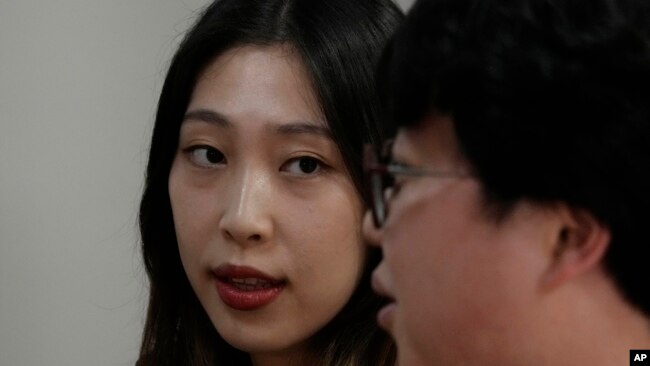以前は韓国には産まないためのいろんな施作があったここを知りませんでした。また、少し前に子供を持たない人たちの考えを問題を取り上げている番組を見ました。韓国の競争社会は厳しいものがあります。
少子化は日本でも大きな問題です。
未来に夢があるのか?そう人々は考えるからでしょう。
VOAで英語を学びましょう!!
韓国は人口危機、多くの人が子供を産まなくなったため(和訳)
South Korea in Population Crisis as Many Stop Having Babies
December 01, 2022
韓国では、多くの大人が子供を産まない、あるいは結婚しないという選択をしています。他の先進国でも似たようなことが起こっていますが、韓国の人口危機は深刻だと考える人が多くいます。
韓国の政府機関が9月に、昨年の合計特殊出生率は0.81に達したと発表しました。合計特殊出生率とは、生殖年齢にある女性1人あたりが産む平均的な赤ちゃんの数です。韓国の出生率は3年前から世界最低を更新しています。
2021年に初めて人口が減少しました。経済への深刻なダメージが懸念されるようになったのです。納税者が減る一方で高齢者が増えるため、労働力不足や退職金への高額支出を予想する声もあります。
ユン・ソクヨル大統領は、この問題に対処するためのより良い方法を見出すよう政策立案者に命じました。韓国は出生率を上げるために過去16年間で2100億ドルを費やしましたが、出生率はまだ低下していると彼は言います。
韓国の若者の多くは、両親や祖父母とは異なり、家族を持つobligation義務を感じていないと言います。子供を持たない理由として:厳しい就職状況、高額な住宅費、男女間の不平等、社会的不平等などを挙げる人がいます。
また、競争社会で子育てにかかる費用が高いことも理由とする声もあります。また、男性が育児の多くを期待する一方で、女性は職場で差別を受けると言う人もいます。
韓国保健社会研究院のイ・ソヨン氏は、人口政策の専門家です。彼女は、「人々は、私たちの国が住みやすい場所ではないと思っています」と言っています。そして、「自分の子どもは自分より良い人生を送れないと思い込んでいて、なぜわざわざ子どもを産まなければならないのかと疑問に思っているのです。」 と付け加えています。
チェ・ユン・ギョン氏は、韓国保育教育研究所の専門家です。いい学校に入れず、いい仕事にも就けない人は、自分が "幸せになれない "”落ちこぼれ”になったと感じている人が多いと言います。韓国には社会支出プログラムがないため、結婚して子供を産んでも、そのように感じてしまうのです。韓国は1960年代から1980年代までの経済成長期に、そのようなプログラムを確立することができなかったと彼女は言います。
結婚しない、子供を作らないという選択をした韓国人の数は、公式には分かりません。しかし、ある国家機関の記録によれば、昨年の韓国の婚姻件数は約19万3000件です。これは1996年の最高値43万件から大きく減少しています。
また、機関の情報によれば、昨年韓国で生まれた赤ちゃんは約26万600人で、1996年の69万1200人から減少しています。最高水準は1971年の100万人でした。最近の数字は、同庁が1970年にそのような情報を集め始めて以来、最低となっています。
1990年代半ばまで、韓国には避妊プログラムがありました。これは、朝鮮戦争後、国の人口増加を遅らせるために政府が始めたものです。政府は、公的医療機関で避妊用の薬や器具を無料で配布しました。また、男性が生殖機能を妨げる手術を受けた場合、兵役の一部を免除する制度も導入されました。
国連の情報によると、韓国の平均的な女性の出産数は、1950年代と60年代には約4〜6人、1970年代には3〜4人、1980年代半ばには2人以下となりました。
韓国では、子供をたくさん産む人に対して、さまざまな奨励策や支援策を講じています。しかし、チェ氏は、出生率の低下が速すぎて、実際の効果が出ていないと指摘します。先月の政府会議で、政府関係者は、人口減少に対処するための新たな対策を近々提案しなければならないだろうと述べています。
ユー・ヨン・イーさんはソウルで金融関係の仕事をしています。大学に入るまでは、子供が欲しいと強く思っていたと言います。しかし、女性の同僚が子供を心配したり、子供が病気になると早退したりするのを見て、考えが変わりました。男性の同僚はそのようなことはなかったと言います。そして、自分が子供を産んだら、仕事の能率が落ちると思ったと言っています。
34歳の夫、チョ・ジュン・ヒさんは、子供を持つ必要はないと考えていると言います。彼は情報技術企業に勤めています。就職して”崖っぷちに立たされたような気分”になったので、人生を楽しみたいとジョウさんは言います。
しかし、38歳のソ・ジ・ソンさんは、自分ではそう思ったことはありませんが、年配の人たちからよく子だくさんの愛国者と言われるそうです。彼女は1月に5人目を出産予定です。
夫は子供の成長を見るのが楽しいと言い、ソ・ジ・ソンさんは家庭での成長を大切にしています。
「みんなかわいいんです。だから、大変でも産み続けているんです」とソさんは付け加えています。
South Korea in Population Crisis as Many Stop Having Babies
Many adults in South Korea have chosen either not to have children or not to marry. Similar things are happening in other developed countries, but many consider South Korea’s population crisis severe.
A South Korean government agency announced in September that the total fertility rate reached 0.81 last year. The total fertility rate is the average number of babies born to each woman in their reproductive years. South Korea’s fertility rate has been the world’s lowest for three years now.
The population decreased for the first time in 2021. It raised concerns for severe damage to the economy. Some observers expect labor shortages and high spending on retirement payments as the number of older people increases while the number of taxpayers decreases.
President Yoon Suk Yeol has ordered policymakers to find better ways to deal with the problem. The fertility rate, he said, is still decreasing although South Korea spent $210 billion over the past 16 years to increase it.
Many young South Koreans say that, unlike their parents and grandparents, they do not feel an obligation to have a family. Reasons some say for not having children include: a difficult job market, costly housing, inequality between the sexes, and social inequality.
Some also say the high cost of raising children in a competitive society is a reason. Some women say men expect them to do much of the childcare while they face discrimination at work.
Lee So-Young is a population policy expert at the Korea Institute for Health and Social Affairs. She said, “People think our country isn’t an easy place to live.” And she added, “They believe their children can’t have better lives than them, and so question why they should bother to have babies.”
Choi Yoon Kyung is an expert at the Korea Institute of Child Care and Education. She said many people who fail to enter good schools and get good jobs feel they have become “dropouts” who “cannot be happy.” They feel that way even if they marry and have children because South Korea lacks social spending programs. She said South Korea failed to establish such programs during its economic growth in the 1960s to the 1980s.
There are no official numbers on how many South Koreans have chosen not to marry or have children. But records from one national agency show there were about 193,000 marriages in South Korea last year. That is a big drop from the highest point of 430,000 in 1996.
Agency information also says about 260,600 babies were born in South Korea last year, down from 691,200 in 1996. The highest level was 1 million babies in 1971. The recent numbers were the lowest since the agency began collecting such information in 1970.
Until the mid-1990s, South Korea had birth control programs, which the government started to slow the country’s population increase after the Korean War. The government gave out birth control drugs and devices for free at public medical centers. It also offered men exemptions from some required military service if they had a medical operation that prevents fertility.
United Nations information shows that the average South Korean woman gave birth to about four to six children in the 1950s and ‘60s, three to four in the 1970s, and fewer than two by the mid-1980s.
South Korea has been offering different incentives and support programs for those who give birth to many children. But Choi said the fertility rate has been falling too fast to see any real effects. During a government meeting last month, officials said they would soon have to propose new measures to deal with the population decrease.
Yoo Young Yi is a financial worker in Seoul. She said that until she went to college, she strongly wanted a baby. But she changed her mind when she saw female coworkers concerned about their children or leaving early when their children were sick. She said her male coworkers did not have to do this. She said she then thought her ability to work would decrease if she had babies.
Her 34-year-old husband, Jo Jun Hwi, said he does not think having children is necessary. He works at an information technology company. Jo said he wants to enjoy his life after getting a job made him “feel like I was standing on the edge of a cliff.”
But 38-year-old Seo Ji Seong said she is often called a patriot by older people for having many babies although she has not thought of it that way. She is expecting her fifth baby in January.
Her husband said he enjoys seeing each of his children growing up, while Seo values their development at home.
“They are all so cute. That’s why I’ve kept giving birth to babies even though it’s difficult,” Seo added.
Words in This Story
obligation – n. something that you must do because it is morally right
society – n. people in general thought of as living together in organized communities with shared laws, traditions, and values
bother – v. to make an effort to do something
exemption – n. freedom from being required to do something that others are required to do
incentive – n. something that encourages a person to do something or to work harder
cliff – n. a high, steep surface of rock, earth, or ice

